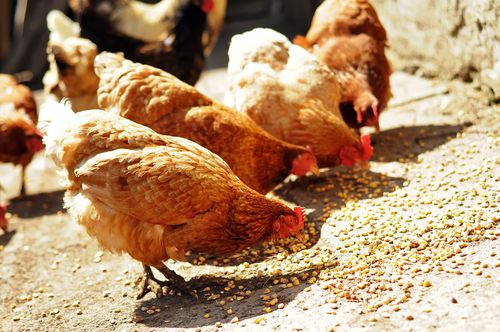GMO Feed For Livestock Is No Better Or Worse Than Other Feed, Meaning We're Still Getting The Same Nutrients

There's a new scientific review from the University of California, Davis, that may single-handedly bring down the great debate surrounding genetically modified organisms, or GMOs.
As a refresher, GMOs are the foods that have been injected with altered DNA in order to increase production of a particular nutrient; the size of livestock to meet growing demand, or, in terms of crops, resistance to pests and weed killer. Alfafa sprouts, canola, corn, and soybeans are but a couple of the crops regularly mixed into livestock (animals') feed.
This review is the largest, and most comprehensive, that's ever been done in regards to GMOs and food. Researchers poured over field data collected from over 100 billion animals from the period when their feed was 100 percent GMO-free to when it was only 10-percent GMO-free. The results showed that GMO feed doesn't alter an animal's health or nutrition, which means it doesn't alter the health or nutrition in the humans who consume them.
"Studies have continually shown that the milk, meat, and eggs derived from animals that have consumed [genetically engineered] feed are indistinguishable from the products derived from animals fed a non-GE diet,” said Alison Van Eenennaam, lead study author and UC Davis animal scientist, in a press release. "Therefore, proposed labeling of animal products from livestock and poultry that have eaten GE feed would require supply-chain segregation and traceability, as the products themselves would not differ in any way that could be detected."
One particularly heated conversation within the GMO debate is that GMO ingredients should, in fact, be labeled. Though unfounded, some science has suggested GMO food has been linked to an increased in food allergies, gastrointestinal disease, as well as other health problems. In response, organizations like the Non-GMO Project have taken it upon themselves to offer third-party verification and labeling for non-GMO food products. This tends to be a more efficient process for pre-packaged foods, so what can be done about livestock?
"To avoid international trade disruptions, it is critical that the regulatory approval process for genetically engineered products be established in countries importing these feeds at the same time that regulatory approvals are passed in the countries that are major exporters of animal feed," Van Eenennaam said.
Source: A. L. Van Eenennaam and A. E. Young. Prevalence and Impacts of Genetically Engineered Feedstuffs on Livestock Populations. Journal of Animal Science. 2014.
Published by Medicaldaily.com



























